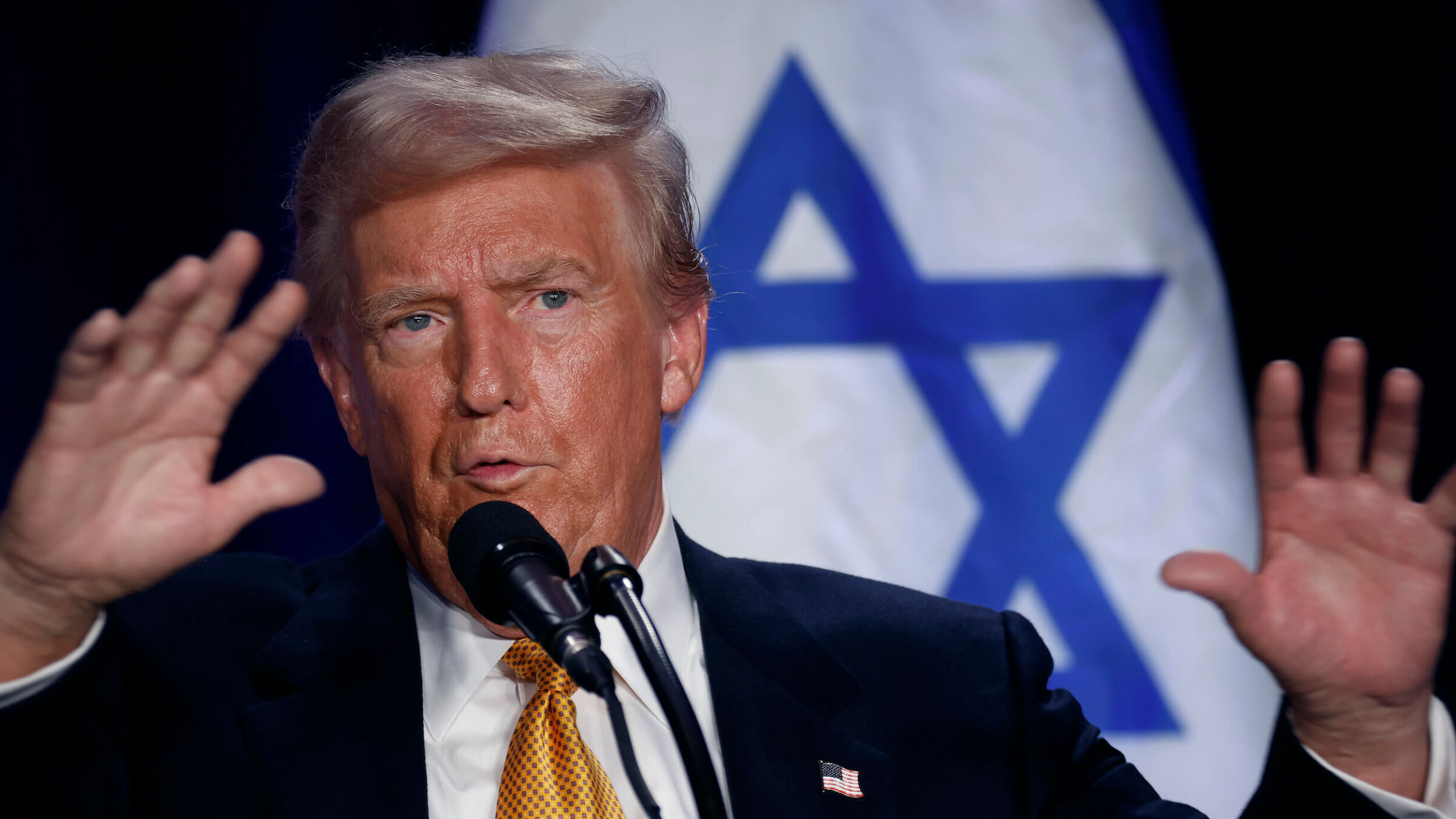I survived Charlottesville. Jews shouldn’t trust Trump when it comes to antisemitism
The first weeks of the president’s second term have been marked by flashy, insubstantial initiatives around antisemitism

President Donald Trump speaks before prominent Jewish donors at an event titled “Fighting Antisemitism in America” at the Hyatt Regency Capitol Hill on September 19, 2024. Photo by Chip Somodevilla/Getty Images
It would be a mistake to deny that the United States is facing a crisis of antisemitism. Anti-Jewish bias and antisemitic violence continue to represent clear and present dangers to our communities: I myself am a survivor of the neo-Nazi assault in Charlottesville in 2017.
But there’s a right and wrong way to fight that bigotry. And President Donald Trump’s first efforts to “combat antisemitism” in his second term are, clearly, in the wrong.
Start with his executive order aimed at combating antisemitism on campuses last week, which will do exactly nothing to address the root causes of the crisis of antisemitism — while doing much to fan the flames of Islamophobia and xenophobia. (Incidents of anti-Muslim bias last year reaching record levels never before seen in the U.S.) That inaction on the issues that truly affect Jews is standard for Trump, who has a long history of using antisemitic tropes, and has historically shown little to no practical concern for Jewish safety.
The order, which was followed by a Monday announcement of a multi-agency Task Force to Combat Antisemitism, offers nothing new in the way of security for Jewish individuals or Jewish institutions. It gives no guarantees of assistance to vulnerable communities facing threats of anti-Jewish terror. It provides no new resources for the education of the U.S. population, or for their inoculation against the antisemitic propaganda currently trending on social media.
Instead, the order — which originated in work done by the Heritage Foundation, authors of the authoritarian Project 2025 and the controversial Project Esther, which purportedly aims to tackle antisemitism — represents the opening salvo of a far-right offensive aimed at purging higher education of political dissidents and taking control of U.S. campuses.
The fact sheet accompanying the order announced it as an effort at “GOING ON OFFENSE TO ENFORCE LAW AND ORDER,” singling out “pro-Hamas aliens and left-wing radicals” in “leftist, anti-American colleges and universities” for special prosecution and even deportation. “The Order,” the fact sheet adds, “demands the removal of resident aliens who violate our laws” — including, apparently, by exercising the right to free speech by protesting.
Look at “left-wing radicals”; look at “leftist.” The “facts” provided by the White House are premised on the convenient fiction that the left is singularly responsible for every antisemitic act in the U.S.
Nowhere do they reckon with, say, the particularly virulent variant of right-wing antisemitism responsible for the unprecedented uptick in lethal violence against Jewish targets during Trump’s first term.
And any shred of doubt about Trump’s commitment to weaponizing antisemitism in service of an ideological agenda focused on quenching free speech on campus should be put to rest by the Monday task force announcement; a statement accompanying the news said the group’s priority would be “to root out antisemitic harassment in schools and on college campuses.”
That agenda matches the one articulated at length by Project Esther, which claims that the “anti-Israel, anti-Zionist, anti-American groups” behind the Palestinian solidarity movement on campus constitute a “terrorist support network,” and as such, must be “dismantled” by way of firings, funding cuts, expulsions and deportations. But Jews can hardly put much trust in an endeavor spearheaded by Christian Right groups like the America First Policy Institute, Family Research Council, and In Defense of Christians, which make up the Heritage Foundation’s National Task Force to Combat Antisemitism.
If the president were serious about fighting antisemitism, he would have to break up with his antisemitic friends and fans, including Holocaust deniers like Nicholas Fuentes, Great Replacement conspiracy theorists like Tucker Carlson, and self-described Western Chauvinists like the Proud Boys. This is something he has shown no intention of doing. Instead, he has opted for an act of political theater.
But given that his executive order, and the task force newly empowered to enforce it, have the force of law behind them, we can expect them to have pernicious real-world consequences, particularly for international students and workers with precarious legal statuses.
We can expect to see instances of racial, religious and political profiling become increasingly commonplace, as the administration puts pressure on universities to identify non-citizen students involved in protests against Israel. Students and staff will be incentivized to report each other to administrators, and administrators pressured to report students and staff to the authorities.
We can also expect to witness the repression of pro-Palestinian speech, the censorship of related topics in the classroom, and ever more violent crackdowns on campus protest — all with the administration’s official blessing.
It is seriously unlikely that any of these measures will make Jewish students or staff any safer — on or off campus — aimed as they are at suppressing speech rather than combating hatred. If anything, they promise to undermine the intercommunal solidarity on which Jewish safety ultimately depends, creating the impression that prioritizing Jewish interests means adhering to a right-wing agenda with which a majority of Jews disagree. There is no future in which that agenda leads to happy results — for any of us.















